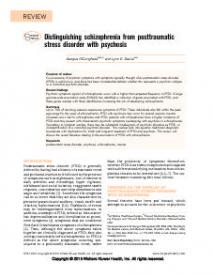Distinguishing schizophrenia from posttraumatic stress disorder with psychosis
Purpose of review Co-occurrence of psychotic symptoms with symptoms typically thought of as posttraumatic stress disorder (PTSD) is well known, and there has been considerable debate whether this represents a psychotic subtype or a comorbid psychotic disorder.
Recent findings Psychotic symptoms typical of schizophrenia occur with a higher than expected frequency in PTSD. A large genome-wide association study (GWAS) has identified a collection of genes associated with PTSD, and these genes overlap with those identified as increasing the risk of developing schizophrenia.
Summary Up to 70% of returning veterans experience symptoms of PTSD. These individuals also fall within the peak age range for the onset of schizophrenia. PTSD with psychosis may occur for several reasons: trauma increases one’s risk for schizophrenia and PTSD; patients with schizophrenia have a higher incidence of PTSD and may present with characteristic psychotic symptoms overlapping with psychosis in schizophrenia. Secondary to symptom overlap, there may be substantial misdiagnosis of psychotic disorders as PTSD, or nonidentification of a comorbid psychotic disorder. This overlap calls into question traditional diagnostic boundaries with implications for initial and long-term treatment of PTSD and psychosis. This review will discuss the recent literature relating to the association of PTSD with schizophrenia.
Geachte bezoeker,
De informatie die u nu opvraagt, kan door psychotraumanet niet aan u worden getoond. Dit kan verschillende redenen hebben,
waarvan (bescherming van het) auteursrecht de meeste voorkomende is. Wanneer het mogelijk is om u door te verwijzen naar de bron
van deze informatie, dan ziet u hier onder een link naar die plek.
Als er geen link staat, kunt u contact opnemen met de bibliotheek,
die u verder op weg kan helpen.
Met vriendelijke groet,
Het psychotraumanet-team.
In: Current Opinion in Psychiatry, ISSN 0951-7367 | 28 | 3 | may | 249–255
http://doi.org/10.1097/YCO.0000000000000158


